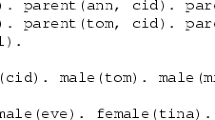Abstract
In this study, we improve our parallel inductive logic programming (ILP) system to enable superlinear speedup. This improvement redesigns several features of our ILP learning system and parallel mechanism. The redesigned ILP learning system searches and gathers all rules that have the same evaluation. The redesigned parallel mechanism adds a communication protocol for sharing the evaluation of the identified rules, thereby realizing superlinear speedup.
Access this chapter
Tax calculation will be finalised at checkout
Purchases are for personal use only
Similar content being viewed by others
References
Fidjeland, A., Luk, W., Muggleton, S.: Customisable multi-processor acceleration of inductive logic programming. In: Latest Advances in Inductive Logic Programming, pp. 123–141 (2014)
Fonseca, N.A., Silva, F.M.A., Camacho, R.: Strategies to parallelize ILP Systems. In: ILP 2005, pp. 136–153 (2005)
Katzouris, N., Artikis, A., Paliouras, G.: Distributed Online Learning of Event Definitions. Computing Research Repository (CoRR), abs/1705.02175 (2017)
Matsumoto, A., Kubota, C., Ohwada, H.: Extracting rules for successful conditions for artificial insemination in dairy cattle using inductive logic programming. In: Proceedings of the 9th International Conference on Machine Learning and Computing, pp. 6–10 (2017)
Mizoguchi, F., Ohwada, H.: Constrained relative least general generalization for inducing constraint logic programs. New Gener. Comput. 13, 335–368 (1995)
Mugglenton, S.: Inverse entailment and progol. New Gener. Comput. 13(3, 4), 245–286 (1995)
Nishiyama, H., Ohwada, H.: Yet another parallel hypothesis search for inverse entailment. In: CEUR Workshop Proceedings of the Late Breaking Papers of the 25th International Conference on ILP, vol. 1636, pp. 86–94 (2016)
Ohwada, H., Nishiyama, H., Mizoguchi, F.: Concurrent execution of optimal hypothesis search for inverse entailment. In: Cussens, J., Frisch, A. (eds.) ILP 2000. LNCS (LNAI), vol. 1866, pp. 165–173. Springer, Heidelberg (2000). https://doi.org/10.1007/3-540-44960-4_10
Shimada, T., Hatano, R., Nishiyama, H.: Server failure detection system based on inductive logic programming and random forest. In: Proceedings of 33rd International Conference on Computers and Their Applications, CATA 2018, March 2018
Skillicorn, D.B., Wang, Y.: Parallel and sequential algorithms for data mining using inductive logic. Knowl. Inf. Syst. 3(4), 405–421 (2001)
Smith, R.G.: The contract net protocol: high-level communication and control in a distributed problem solver. IEEE Trans. Comput. C-29(12), 1104–1113 (1980)
Fonseca, N.A., Srinivasan, A., Silva, F., Camacho, R.: Parallel ILP for distributed-memory architectures. Mach. Learn. J. 74(3), 257–279 (2009)
Acknowledgments
This research was supported by grants from the Project of the Bio-oriented Technology Research Advancement Institution, NARO (the special scheme project on advanced research and development for next-generation technology).
Author information
Authors and Affiliations
Corresponding authors
Editor information
Editors and Affiliations
Rights and permissions
Copyright information
© 2018 Springer International Publishing AG, part of Springer Nature
About this paper
Cite this paper
Nishiyama, H., Ohwada, H. (2018). Parallel Inductive Logic Programming System for Superlinear Speedup. In: Lachiche, N., Vrain, C. (eds) Inductive Logic Programming. ILP 2017. Lecture Notes in Computer Science(), vol 10759. Springer, Cham. https://doi.org/10.1007/978-3-319-78090-0_8
Download citation
DOI: https://doi.org/10.1007/978-3-319-78090-0_8
Published:
Publisher Name: Springer, Cham
Print ISBN: 978-3-319-78089-4
Online ISBN: 978-3-319-78090-0
eBook Packages: Computer ScienceComputer Science (R0)




